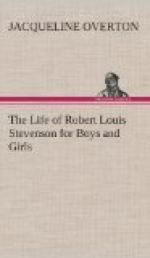“Of course,” he said, speaking of this dedication when he wrote to Cummie about the book, “this is only a flourish, like taking off one’s hat, but still a person who has taken the trouble to write things does not dedicate them to anyone without meaning it; and you must try to take this dedication in place of a great many things that I might have said, and that I ought to have done; to prove that I am not altogether unconscious of the great debt of gratitude I owe you.”
[Illustration: Facsimile of letter sent to Cummy with “An Inland Voyage”]
If Thomas Stevenson had been one of the first to doubt his boy’s literary ability, he was equally quick to acknowledge himself mistaken. He was proud of his brilliant son, keenly interested in whatever he was working on and, during the days spent together at Skerryvore, gave him valuable aid in his writing.
To have this old-time comradeship with his father, to enjoy his sympathy and understanding once more was Stevenson’s greatest joy at this time; a joy which he sorrowfully realized he must soon part with forever as his father’s health was failing rapidly.
Thomas Stevenson remained at Skerryvore until April, 1887, when he left for a short visit to Edinburgh. While there he became suddenly worse and died on the 8th of May.
Louis’s greatest reason for remaining in England was gone now, and he determined to cross the ocean with his family once more.
His mother willingly gave up her home, her family, her friends, and the comforts she had always enjoyed to go with him to a new country, on any venture he might propose if his health could only be improved thereby.
On August 21, 1887, Louis bade good-by to Scotland for the last time and sailed away from London on the steamship Ludgate Hill for New York.
CHAPTER VII
SECOND VISIT TO AMERICA
“Tis a good land to fall in with men, and a pleasant land to see.”
—(Words spoken
by Hendrik Hudson when he first brought his
ship through the Narrows and saw the Bay
of New York.)
Stevenson’s second landing in New York was a great contrast to his first. The “Amateur Emigrant” had no one to bid him welcome and Godspeed but a West Street tavern-keeper, and now when Mr. Will Low, his old friend of Fontainebleau days, hastened to the dock to welcome him on the Ludgate Hill, he found the author of “Dr. Jekyll and Mr. Hyde” already surrounded by reporters.
The trip had done him good in spite of their passage having been an unusually rough one, with numerous discomforts. The Ludgate Hill was not an up-to-date liner and she carried a very mixed cargo. The very fact of her being a tramp ship and that the passengers were free to be about with the men and officers, stay in the wheel-house, and enjoy a real sea life, delighted Stevenson, and he wrote back to Sidney Colvin:




